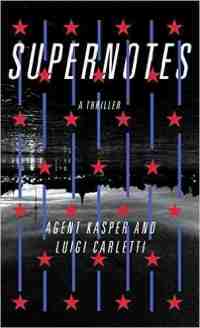Supernotes by Agent Kasper and Luigi Carletti
 Monday, February 1, 2016 at 8:10AM
Monday, February 1, 2016 at 8:10AM 
Published in Italy in 2014; published in translation by Nan A. Talese/Doubleday on January 12, 2016
Since Supernotes is based on a true story, it doesn’t have all the twists and turns and action and suspense that a traditional spy novel delivers. Real life just isn’t as exciting as fiction. On the other hand, if the story is more-or-less true, an intriguing series of events can be a good substitute for an action-packed plot. Unfortunately, Supernotes delivers too little intrigue while telling a story that isn’t entirely convincing.
Kasper is an Italian, although his father was born in Memphis and much of his family lives in St. Louis. He is a former member of Italy’s national police who became an airline pilot and did some shady consulting work for the national police. The work involved playing an undercover role in large drug deals and money laundering operations. According to the Italian government, he has “a right-wing past and dangerous friends.” In Cambodia, he owned a bar with a former CIA agent and engaged in vaguely-described contract espionage.
We learn of Kasper’s history in flashbacks. The story begins with a Cambodian official warning Kasper and the former CIA agent to leave Phnom Penh. Kasper makes it as far as the Thai border, where he is arrested.
The story focuses on Kasper’s detention. Americans who identify themselves as Homeland Security and FBI agents play a dark role. Kasper’s mother and girlfriend have enlisted the help of Italian lawyer named Barbara Belli, who tries to win Kasper’s release. A variety of other people also drop in on the imprisoned Kasper, who is apparently being kept alive only because his mother pays bribes on his behalf.
One problem with writing a novel from a single character’s perspective, at least when the book is based on that character’s real world experience, is the question of credibility. The reader must believe that Kasper is telling the truth and, if he is, that his perception of reality is accurate. Kasper isn’t the kind of person I would trust under the best of circumstances, and given the temptation to use this book to repair his reputation, I have little reason to believe that it is entirely honest.
Even if Kasper is telling his story in good faith, I suspect that other players would have quite a different perspective on the events that Kasper describes. Supernotes would probably be a fascinating work of nonfiction if written by an objective outsider who interviewed, not just Kasper, but all the relevant people in his life. As it stands, we have only Kasper’s word that he was “disavowed” while acting as an undercover agent for the Italian police, that Americans offered to secure his release from prison for nefarious reasons, and that he was acting in anyone’s interest other than his own when he tried to get his hands on more than a hundred million dollars in supernotes.
The story bobs and weaves around the topic of supernotes -- the book’s title and presumably its intended theme -- but only as it nears its end do supernotes play any significant role in the plot. Maybe China and North Korea really are flooding Asia with undetectable counterfeit American currency. Maybe Kasper’s theory about who is really backing the counterfeit money machine (a doubtful conspiracy theory that has been around for several years) is correct. But Kasper’s assertion that he was imprisoned because he “knew too much” about supernotes strikes me as being just a little too convenient.
This is a work of fiction so the story doesn’t need to be true, but it does need to be believable. Some of the book -- the brutality in Prey Sar prison, political corruption in Cambodia, the money extorted from Kasper’s family -- is easy to believe. It is Kasper, casting himself in a heroic role, I doubted. Fictional characters are credible when they show their warts, but the character of Kasper is ambiguous. We are told that Kasper was “investigated” for certain crimes, but did he commit them? We are told that as a young man, he sympathized with fascism, but did he sympathize with right wing terrorists? Kasper isn’t telling. Kasper blames his problems on a host of people other than himself, but are they really to blame? Kasper rejects his portrayal as a radical “loose cannon” by the press, but maybe the press got it right and Kasper is using the book to rewrite his legacy. Who knows?
Some parts of the novel -- primarily flashbacks that take place outside of the prison setting -- are quite good. A scene in Zurich evokes the kind of tension that a spy novel fan expects. Most of the story, however, is less than riveting. The final chapters make an obvious but unsuccessful attempt to create suspense. Again, I might excuse those failings that if the story had the feel of reality, but Supernotes didn’t persuade me to view Kasper as either a hero or a victim, despite his intense desire to play both roles.
NOT RECOMMENDED
 TChris |
TChris |  Post a Comment |
Post a Comment |  Agent Kasper,
Agent Kasper,  Italy,
Italy,  Luigi Carletti in
Luigi Carletti in  Thriller
Thriller
Reader Comments